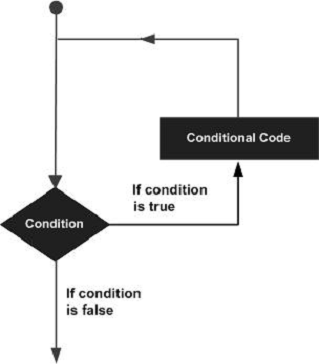Looping is described as repeatedly repeating the same procedure until a certain condition is met. In the C programming language. There are three types of loops in the C programming language, and we will cover all elements of C loops in this section of the course.
In most cases, statements are executed in order: the first statement in a function is executed first, followed by the second, and so on.
Different control structures are available in programming languages, allowing for more complex execution pathways.
The general form of a loop statement in most programming languages is shown below.

To address looping needs, the C programming language includes the following types of loops.
| Sr.No. | Loop Type & Description |
|---|---|
| 1 | while loop While a given condition is true, it repeats a statement or a set of assertions. Before performing the loop body, it checks everything in the condition. |
| 2 | for loop The code that controls the loop variable is abbreviated and executes a sequence of instructions several times. |
| 3 | do...while loop It's similar to a while statement, with the exception that it checks the condition at the conclusion of the loop body. |
| 4 | nested loops Inside any other while, for, or do..while loop, you can utilise one or more loops. |
Control statements in loops alter the execution sequence. All automated objects generated in a scope are deleted when execution exits that scope.
The following control statements are supported by C.
| s.no | Teacher_Name |
|---|---|
| 1 | break statement The loop or switch statement is terminated, and execution is transferred to the statement immediately after the loop or switch. |
| 2 | continue statement This causes the loop to skip the rest of its body and retest its state before repeating. |
| 3 | goto statement Control is passed to the labelled statement. |
If a condition never becomes false, a loop becomes endless. For this, the for loop is typically employed. You may construct an eternal loop by leaving the conditional expression empty since none of the three expressions that make up the 'for' loop are necessary.
It is presumed that the conditional statement is true when it is not present. Although you may have an initialization and increment expression in C, the for(;;) construct is more often used to represent an endless loop.
In the case when we don't know the number of iterations ahead of time, we can utilise the while loop in C. The while loop executes the block of statements until the condition provided in the while loop is fulfilled. A pre-tested loop is another name for it.
The for loop is utilised when we need to execute a section of code repeatedly until the provided condition is met. A per-tested loop is another name for the for loop. If the number of iterations is known ahead of time, the for loop is preferable.
The syntax of the for loop in C is as follows:
|
|